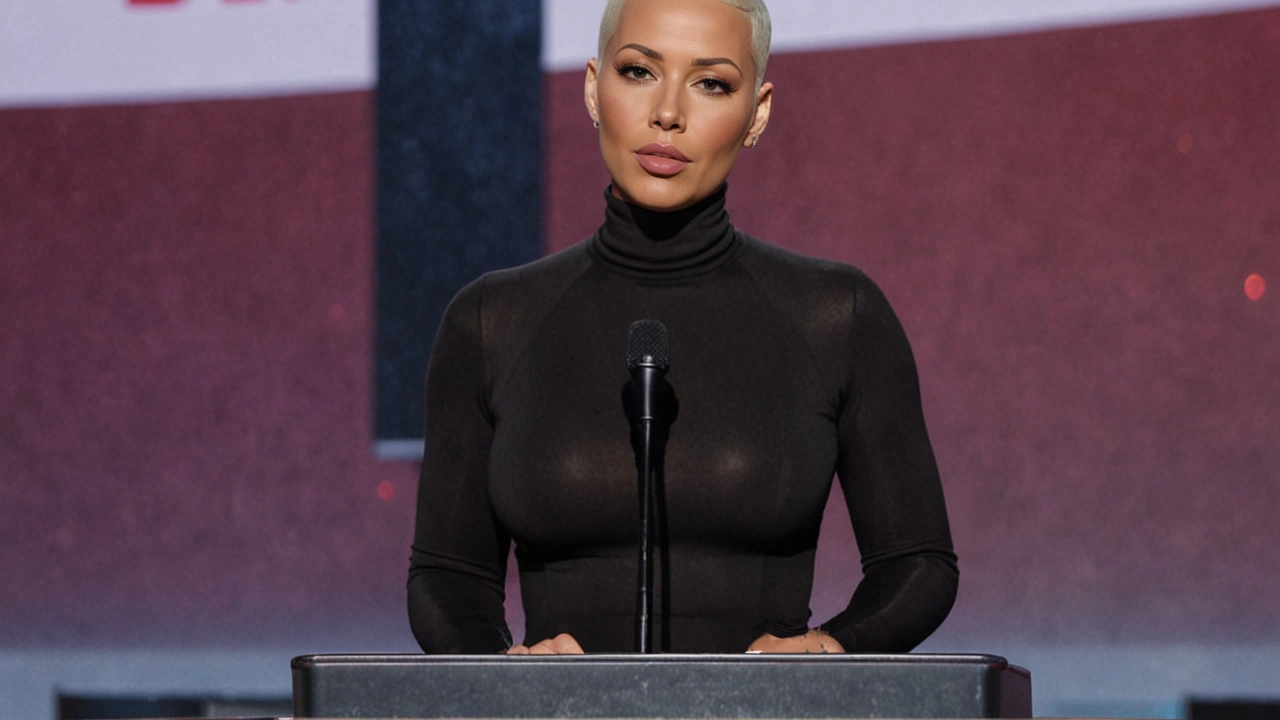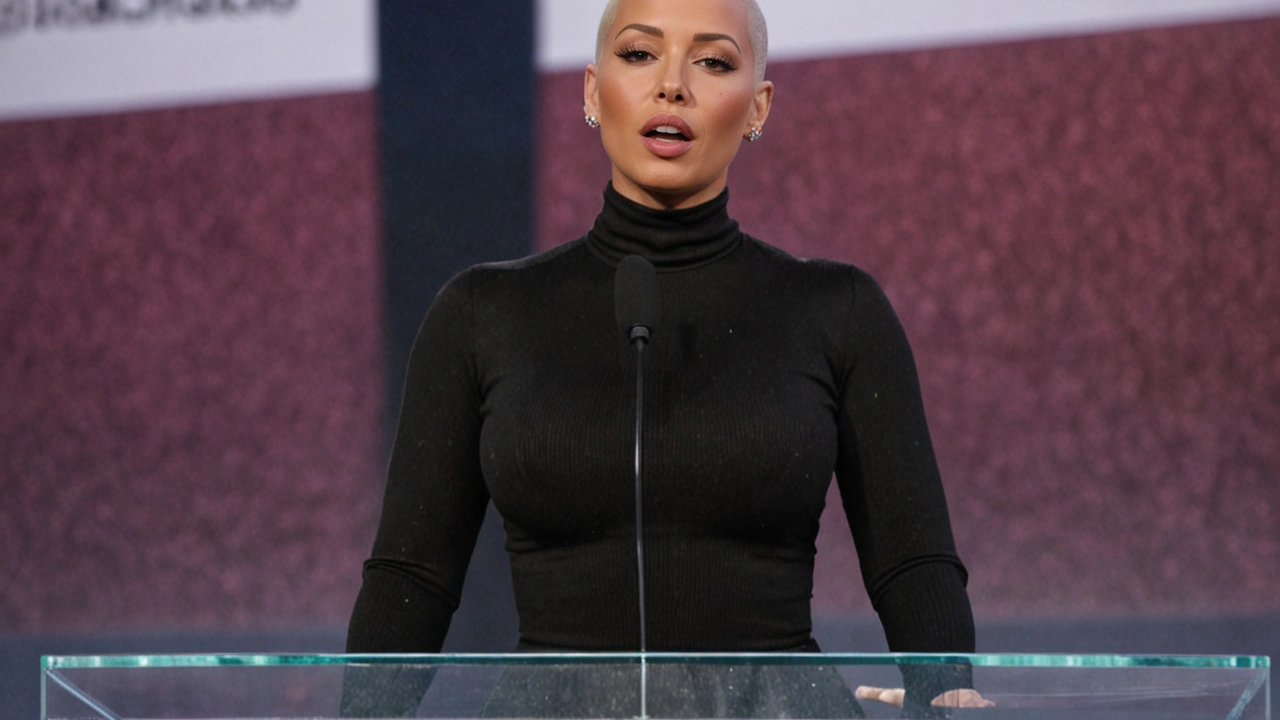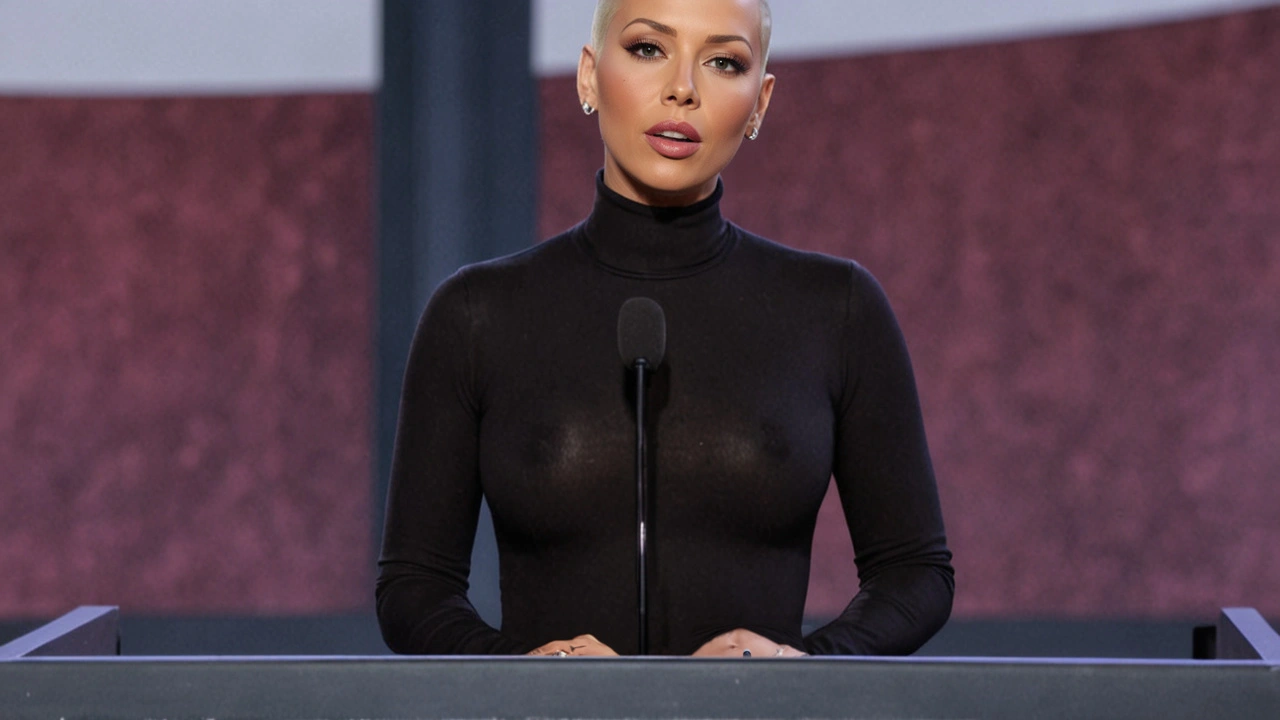Amber Rose Endorses Trump at Republican National Convention
Model and rapper Amber Rose made headlines with her unexpected endorsement of former President Donald Trump at the Republican National Convention held in Milwaukee, Wisconsin. Known for her outspoken and bold personality, Rose's support for Trump has come as a surprise to many, given her previous stances on various social issues. Addressing the crowd, she passionately defended Trump, asserting that the media has unfairly labeled him a racist and that his policies and administration have genuinely embraced diversity.
Rose emphasized that Trump, along with his followers, is committed to promoting diversity and equality regardless of race or sexual orientation, an assertion that has been met with skepticism and outrage from many quarters. She also criticized mainstream media for perpetuating what she described as a misleading narrative about Trump's intentions and actions, urging Americans to see beyond the headlines and understand the true impact of his presidency.
Biden-Harris Campaign Reacts with Sharp Criticism
The endorsement has not gone unnoticed, especially by the Biden-Harris campaign, which swiftly issued a pointed rebuttal. Sarafina Chitika, a senior spokesperson for the campaign, stated that Rose's support for Trump is tantamount to endorsing policies that have systematically harmed marginalized communities, particularly Black communities. Chitika highlighted the significant rise in unemployment, lack of adequate healthcare coverage, and the surge in crime rates during Trump's tenure, arguing that these are direct consequences of his administration's policies.
According to Chitika, by supporting Trump, Rose is effectively turning a blind eye to the suffering experienced by many in these communities. The spokesperson accused Trump of favoring the wealthy at the expense of the most vulnerable, and she called on voters to critically assess the real effects of Trump's policies rather than falling for rhetoric and sensationalist media portrayals. The Biden-Harris campaign's sharp response underscores the high stakes involved in the upcoming 2024 election and the deepening political divide in the country.
A Controversial Figure Amid Diverse Voices
The Republican National Convention, which featured a lineup of prominent political figures, including U.S. senators, representatives, and state governors, in addition to the president of the International Brotherhood of Teamsters, served as a platform for a range of conservative voices. However, Rose's presence and endorsement stood out, given her background in the entertainment industry and her influence on social media. Her speech has added a layer of complexity to the ongoing debate about Trump's legacy and the direction in which the country should head.
Despite the backlash, Rose remains steadfast in her support. She has taken to various social media platforms to defend her stance, engaging in heated discussions with critics and supporters alike. Her followers, many of whom admire her for her independence and willingness to speak her mind, have largely rallied behind her, though there remains a significant portion of her fanbase that is dismayed by her political alignment. It remains to be seen how this endorsement will impact her career and public image moving forward.

The Broader Implications for the 2024 Election
The controversy surrounding Amber Rose's endorsement highlights the broader political tensions that are brewing as the 2024 election approaches. The election is shaping up to be one of the most contentious in recent history, with both sides vying for the support of key demographic groups. For the Biden-Harris campaign, ensuring that the negative impacts of Trump's policies are front and center is a critical strategy to garner support and mobilize voters.
On the other hand, Trump's campaign is keen on presenting a narrative of progress and unity under his leadership, emphasizing economic growth and the recovery from the COVID-19 pandemic. Amber Rose's endorsement plays into this narrative, as she attempts to bridge the gap between the entertainment world and the political arena, bringing with her a unique perspective and a significant following.
Fact vs. Fiction in Political Endorsements
One of the key issues emerging from this controversy is the role of media and perception in shaping political narratives. Rose's assertion that the media has misrepresented Trump resonates with a segment of the electorate that feels disillusioned with traditional news outlets. This sentiment is not new, but it has become increasingly pronounced in the digital age, where information is easily accessible yet often difficult to verify.
The Biden-Harris campaign's response underscores the importance of discerning fact from fiction. By focusing on the tangible outcomes of Trump's policies, the campaign aims to provide a counter-narrative that is grounded in data and real-world impact. However, persuading voters to look beyond charismatic endorsements and media soundbites remains a significant challenge.

Public Reaction and Future Prospects
The public reaction to Amber Rose's endorsement has been mixed, reflecting the polarized nature of American politics. Social media platforms have become battlegrounds where supporters and detractors clash over her decision. Some view her endorsement as a courageous stand against a biased media, while others see it as a betrayal of the values she has previously championed.
The coming months will be crucial for both political campaigns as they navigate the complex landscape of endorsements, public opinion, and media influence. For Amber Rose, the endorsement has already proven to be a defining moment in her public life, one that will shape her legacy in the eyes of both her supporters and critics.
As the 2024 election draws nearer, the importance of informed voting and critical engagement with political discourse cannot be overstated. Amber Rose's endorsement of Donald Trump serves as a stark reminder of the diverse voices and perspectives that contribute to America's democratic process, highlighting the need for ongoing dialogue and scrutiny as the nation charts its future course.






7 Comments
Brian Gallagher
July 17, 2024 AT 04:29 AMThe strategic alignment of cultural visibility with political messaging represents a paradigmatic shift in the discourse architecture of contemporary populism. Rose's endorsement, while seemingly incongruous with her prior advocacy frameworks, functions as a destabilizing vector within the hegemonic media narrative, thereby reconfiguring the epistemic boundaries of what constitutes 'authentic' political legitimacy.
Her articulation of Trump's policy outcomes through the lens of demographic inclusivity challenges the monolithic framing perpetuated by institutionalized journalism. This is not mere performative allyship-it's a recalibration of the signaling equilibrium in identity politics, where symbolic capital is being redeployed to subvert dominant ideological scaffolds.
The Biden-Harris rebuttal, by contrast, remains tethered to a quantitatively reductive framework that conflates macroeconomic indicators with moral accountability. Such a reductionist approach fails to account for the heterogeneity of lived experience among marginalized communities, many of whom report tangible improvements in small business access, regulatory relief, and community policing reforms under the prior administration.
The real disruption here isn't the endorsement itself-it's the collapse of the assumed correlation between progressive aesthetics and progressive policy outcomes. Rose's stance forces a reckoning: is alignment with identity-based movements contingent upon adherence to a single ideological orthodoxy, or can genuine equity manifest through divergent policy pathways?
As a cultural ambassador navigating this terrain, I see this as a watershed moment for the decoupling of performative wokeness from substantive governance. The media's outrage is not a rebuttal-it's an admission of their own narrative fragility.
Elizabeth Alfonso Prieto
July 19, 2024 AT 04:01 AMhow can she say that?? she literally used to post about police brutality and trans rights and now she’s down with the guy who tried to ban trans people from the military and called black people ‘animals’?? i’m so disgusted. she’s just trying to get attention again. i unfollowed her. this is so cringe. she sold out. period.
Harry Adams
July 19, 2024 AT 12:22 PMHow utterly predictable. The commodification of dissent has reached its apotheosis in the form of a celebrity performing performative contrarianism for algorithmic clout. Rose’s speech was less a policy critique and more a masterclass in the semiotics of outrage baiting.
Her invocation of ‘diversity’ under Trump is not merely disingenuous-it’s linguistically incoherent. The administration’s policies on immigration, voting rights, and reproductive healthcare systematically eroded the very structures that enable pluralism. To call this ‘inclusion’ is to engage in Orwellian doublespeak of the highest order.
And yet, the fact that this resonates with a segment of the populace speaks less to her persuasiveness and more to the profound epistemic decay of American public discourse. We are no longer debating policy-we are performing tribal affiliation through celebrity proxies.
One must ask: is this the new zenith of postmodern politics? Where substance is irrelevant, and symbolic rebellion against the ‘mainstream’ becomes the ultimate virtue-even when it aligns you with the very forces you once condemned?
Kieran Scott
July 20, 2024 AT 03:09 AMLet’s be brutally honest-Amber Rose is a walking cognitive dissonance engine. She built her brand on ‘woke’ aesthetics, then turned around and endorsed the man whose administration dismantled the Affordable Care Act, targeted Dreamers, and appointed judges who rolled back reproductive rights. This isn’t ‘independent thinking’-it’s opportunistic self-sabotage wrapped in a velvet glove of performative courage.
The media didn’t ‘label’ Trump a racist-his own words, his own policies, his own actions did that. He called Mexican immigrants ‘rapists.’ He praised white supremacists in Charlottesville. He tried to steal an election. And now she’s standing on a stage, pretending he’s some kind of civil rights icon? That’s not bravery-it’s delusion.
And don’t give me that ‘media is biased’ nonsense. The media didn’t invent the fact that Trump froze foreign aid to Ukraine for personal gain. They didn’t invent the fact that his DOJ prosecuted Black Lives Matter protesters while ignoring armed white militias. These are facts. Not narratives. Facts.
Her fanbase’s loyalty is a symptom of a culture that confuses shock value with authenticity. She’s not a rebel. She’s a clown with a mic and a PR team. And the fact that people are still buying this is the real tragedy.
Joshua Gucilatar
July 21, 2024 AT 10:23 AMAmber Rose didn’t just endorse Trump-she handed him a glitter bomb wrapped in a Black Lives Matter T-shirt and called it a peace offering. The audacity is almost poetic. She’s the human embodiment of a TikTok trend that says ‘I’m not racist but…’ and then proceeds to quote a 2017 Fox News clip as if it’s scripture.
Let’s not pretend she’s some rogue intellectual. She’s a former reality TV star who turned activism into a brand, and now she’s pivoting to politics like it’s another merch drop. Her speech was less policy analysis and more a 12-minute infomercial for her new persona: ‘I’m the woke girl who got tired of being woke.’
And the Biden campaign’s response? Too polite. They should’ve dropped a video montage of Trump’s own words-‘very fine people on both sides,’ ‘shithole countries,’ ‘I could shoot someone on Fifth Avenue and not lose voters’-and then just said, ‘This is the man she’s backing. You decide.’
The real story here isn’t her endorsement-it’s how many people still think ‘I’m just speaking my truth’ excuses you from being fact-checked. She’s not a visionary. She’s a walking misinformation vortex with a million followers and zero accountability.
jesse pinlac
July 21, 2024 AT 16:13 PMIt is deeply troubling to witness the erosion of intellectual coherence in public discourse, wherein celebrity status is erroneously equated with political acumen. Rose’s endorsement is not an act of dissent-it is a capitulation to the very populism she once purported to oppose.
Her invocation of ‘diversity’ under a regime that implemented a Muslim ban, separated children at the border, and defunded community health centers is not merely ironic-it is grotesque. One cannot simultaneously champion marginalized communities and endorse a leader whose policies were explicitly designed to disenfranchise them.
The notion that media bias is the primary obstacle to understanding Trump’s legacy is a red herring. The evidence of his administration’s impact is documented in congressional records, CDC reports, and economic datasets-not in op-eds. Her appeal to ‘see beyond the headlines’ is a convenient evasion of empirical scrutiny.
One must ask: if her values were truly independent of media influence, why did she wait until now to ‘see the truth’? Why not during the 2017 travel ban? Why not during the 2018 family separations? The timing is not coincidental-it is strategic. And that is not courage. It is calculation.
Jess Bryan
July 23, 2024 AT 11:41 AMThey’re all lying. The media is hiding the real stats-Trump’s policies created the most jobs for Black Americans in history. The unemployment rate hit record lows. The crime stats were manipulated by the left. They don’t want you to know the truth because they’re scared of what happens when people wake up. This is all part of the deep state’s plan to silence anyone who dares speak out. Rose is one of the few who still has the guts to say it. They’ll come for her next.